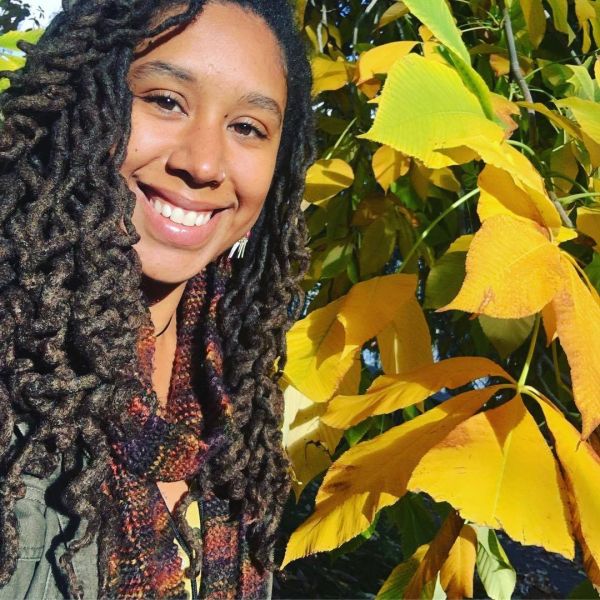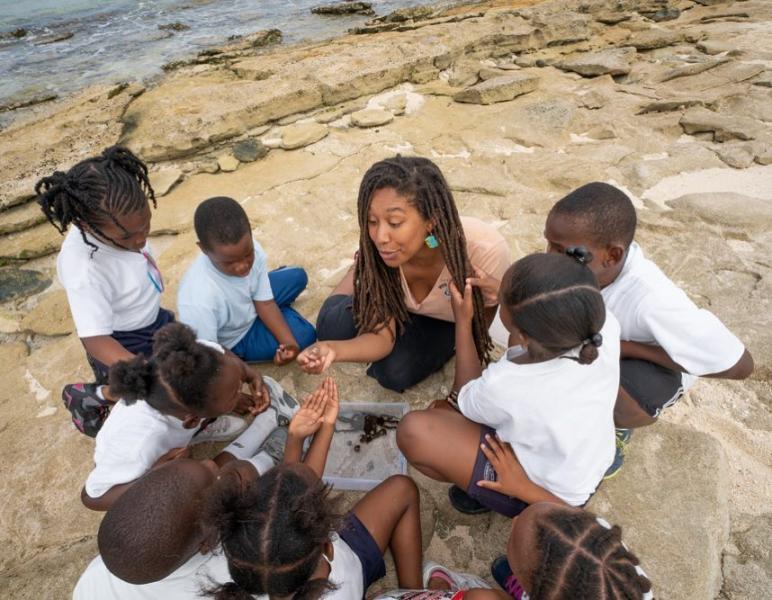Image

-
Olivia Walton
Education Coordinator, St. Croix Environmental Association
- 30 Under 30
- 2020
- CEE-Change Fellow
- 2021
CEE-Change Fellow
Olivia Walton (she/her), brings her mission as an educator to this fellowship: "to foster a passion for celebrating and protecting the natural world through interdisciplinary, exploratory, and inspirational opportunities for kids of all ages and backgrounds; particularly the most underrepresented and at-risk members of our global community." Olivia’s experiences of creating equitable and engaging environmental education (EE) content and connecting with communities in a culturally respectful and relevant way will be integral for a project prioritizing both civics and environmental education.
In her time outside of work, Olivia loves cooking—mostly Italian food because she’s half Italian—and enjoys reading Tarot Cards. If Olivia could travel to any place in the world, she’d travel to Caño Cristales, nature's rainbow river!
Sustainable Food for Freedom City
The Project
This community action project is a community-driven effort to bring interpretive signage to the area surrounding a local fish market, encouraging environmental stewardship and sustainable fishing practices by encouraging creative and collaborative use of the market space, and installing locally designed, culturally relevant, and engaging signs/murals describing "Reef Responsible" fishing practices. Local artists, community members, fishermen, and the neighboring community garden will all be partners in bringing sustainable resources, local pride, and environmental education into this communal place. The project will culminate with a community fish fry, featuring sustainably caught catch, to celebrate the Frederiksted community’s collaborative efforts to address stewardship, food security, civic engagement, and environmental education.
Goal
The overarching goal of this project is to bring life and excitement back into a currently under-utilized fish market and the surrounding underserved area by collaborating with the neighborhood on a community action project that educates the local residents and those who would be engaging with the space on the most sustainable fish choices for vending and purchasing.
Why A Project Focused on Sustainable Fishing Practices?
This community wants to see the space used for something more positive than it's current state, but it is critical that we prioritize an environmentally sound path to bringing back accessible resources into this community.
Action Steps
I have broken the project time period into 4 parts with a final culminating event.
- The first months of September and October focus on organizational outreach. There are a couple of organizations also working towards revitalizing the Frederiksted community, predominately our Department of Planning and Natural Resources (DPNR) with the community-based group "Clean Sweep Frederiksted". Through my role at St. Croix Environmental Association (SEA) I will be coordinating efforts with these groups so that our projects, although their funding is on a much larger governmental scale, are complementary and collaborative. This will include attending the weekly meetings about DPNR's Reef Responsible program that recommends the most sustainable fish to consume, connecting with the local restaurants involved in this project, also meeting with Clean Sweep Frederiksted and getting connected to the local leaders in the artistic side of the community's renaissance efforts.
- November to December will be spent on community outreach and surveying. During this time SEA will host a weekend "pop-up" event with another community-based organization the Good Food Coalition to bring education about food deserts and the importance of access to sustainable resources. This event will also be where we tap into this neighborhood with "Share what you want to SEA" community surveys to build excitement, get community input, and identify young environmental leaders who are interested in supporting the project.
- January and February will be the designing of the signs with input from the Reef Responsible group and local artists and the coordination of the volunteers at the instillation site and those assisting with creation.
- Then March and April will be the physical building and instillation of the interpretive signage.
- Finally, the Freedom City Fish Fry will take place in May to celebrate the efforts of the entire community!
EE 30 Under 30: Class of 2020
Hickory, NC, United States
Age: 29
Olivia leads nature-based field trips with inspirational and representative conservation heroes to encourage students in underserved communities to celebrate their environment.
How are you using education to build more sustainable and equitable communities?
For there to be a sustainable future, the adults of tomorrow must embrace protecting the Earth today. We do not currently live in a world where there is equitable access to the educational opportunities which encourage this, especially for the youth that will be most affected by an unsustainable future. My mission as an educator is to foster a passion for celebrating and protecting the natural world through interdisciplinary, exploratory, and inspirational opportunities for kids of all ages and backgrounds, particularly the most underrepresented and at-risk members of our global community. I created Field Trips for Earth to partner with schools and organizations in underserved areas to provide students with engaging environmentally-focused field trips within their community while celebrating diverse local conservation heroes. I hope to bring representative and culturally relevant environmental education to communities facing systemic obstacles. Seeing yourself and your environment celebrated imparts the value of stewardship.

Tell us about your journey to where you are today.
Growing up on the island of St. Croix, US Virgin Islands, I had the joy of being surrounded by so many wonders of the natural world. By the age of 13, I was spending most of my free time running around barefoot or 60 feet below the ocean's surface scuba diving. A love for the outdoors was hard to avoid, but that love was then cultivated and celebrated by a family who cared deeply for the health of our environment. I was extremely privileged and would eventually come to learn that my opportunities to form a relationship with my environment weren't afforded to many other children. It was my graduate work looking at the community-level impacts of implementing environmental education in a Bahamian elementary school that would eventually empower me to embark on a journey to change that reality for students who lack access to engaging experiences in nature.
What advice would you give to the next generation of leaders?
Learning to live in harmony with our natural world is a generational journey, not a destination. The responsibility we all share to strive for a more sustainable and equitable future is not a burden we must struggle to bear, it's a chance to celebrate the connection we have to the land that gives us life, to all that has been, and to all that will be. The leaders of tomorrow will have the responsibility to voyage onward and hopefully upward. For all those who will inherit the baton as leaders, I urge you to always celebrate your sense of curiosity and never cease to embrace the spirit of exploration. The path forward isn't paved but with courage and commitment; your footsteps will lead the way.
Who do you look up to as inspiration?
I draw my deepest inspiration from someone, really a group of someones, who I technically don't "look up to" ... at least not in the physical sense, since they are typically quite shorter than myself. I've always been most inspired by children; they are why I do what I do as well as who I do it for. The way children see the world is how I hope to always view life, with a deep sense of wonder and fascination for even the smallest of things. It's that curiosity and passion for exploration that keeps me dreaming big for both my future and theirs. My dedication to building a more equitable and sustainable tomorrow is maintained by engaging with youth and encouraging them to embrace the knowledge and tools necessary to protect our natural environment. I see a different future for them because through their eyes the possibilities are limitless.
Describe your work in a haiku.
Teach them to love Her
for tomorrow she is theirs
We have but one Earth.